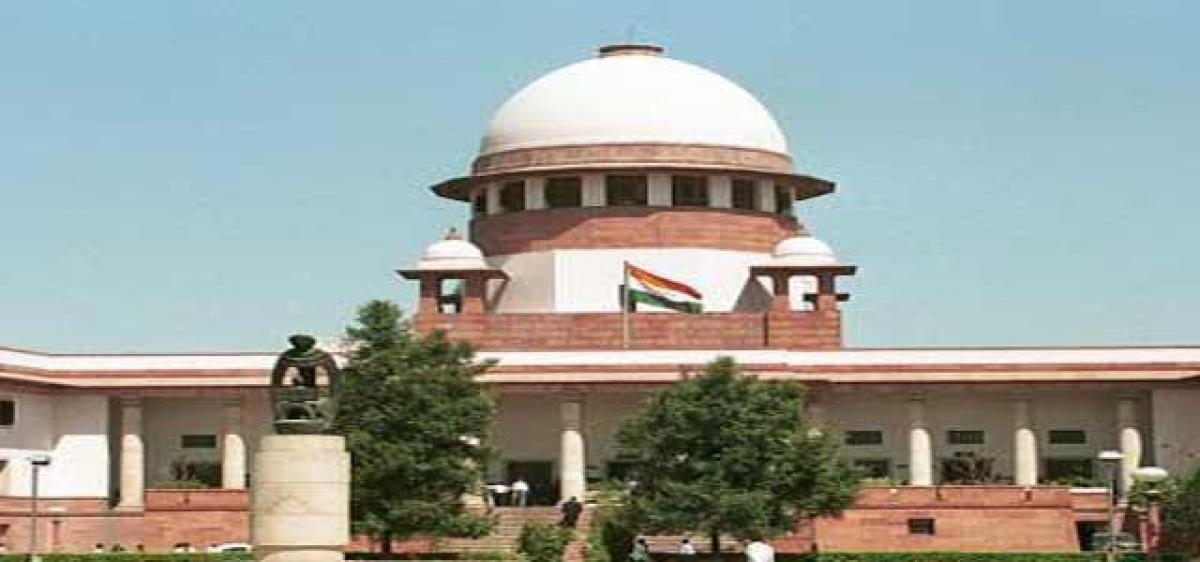Live
- A Guide to Temperature and Humidity Standards in Data Center Server Rooms
- Gadwal collector briefs on details of voters
- Jupally Krishna Rao takes part in Alampur rallu
- Bharath Prasad files 3rd Nomination
- Baisakh Month: A Time of Auspicious Beginnings and Sacred Festivals
- Oust BJD govt for overall development, says Shah
- Unveiling the Hidden Gems: Surprising Health Benefits of Garlic Peels
- Overcoming Sleep Struggles: A Comprehensive Guide to a Restful Night
- RTC bus hit the auto
- MLA Kuchukula Rajesh Reddy participated in the Birappa festival
Just In
Why Supreme Court nixed appointment of four RTI Commissioners


Four Information Commissioners of the AP-Telangana Information Commission are heading home as the Supreme Court dismissed their SLP challenging the AP High Court judgment that quashed their appointments.
Four Information Commissioners of the AP-Telangana Information Commission are heading home as the Supreme Court dismissed their SLP challenging the AP High Court judgment that quashed their appointments.
The Supreme Court on Thursday dismissed a Special Leave Petition (SLP) filed by four Information Commissioners (ICs) of the Andhra Pradesh Information Commission (APIC) challenging the 2013 order of the Andhra Pradesh High Court quashing their appointments.
The SC dismissed their SLP after staying the HC order in 2013. The ICs continued in their posts and have completed more than four years of their 5-year tenure. As their SLP is now dismissed, they have to head home.
In 2012, the then Congress government in the unified state of Andhra Pradesh began the process of appointing Information Commissioners to the APIC after a couple of writ petitions were filed in the HC. The writ petitions were filed because of the impending vacancies in the APIC and that the constitutional and statutory obligations of the APIC cannot be discharged unless the commissioners were appointed.
The government of the day went ahead with the selection of 8 persons for the post of ICs and sent those names to the Governor. As per sec 15(3) of the RTI act, a committee consisting of the Chief Minister, Leader of the Opposition in the Assembly and a Cabinet Minister recommends the names to the Governor.
The Governor approved four names, and asked the selection committee to reconsider the recommendation of the following four persons as he felt that their selection appeared to attract the infirmities under Sec 15(6) of the RTI act: Varre Venkateswarlu; Lam Thanthiya Kumari; Imtiaz Ahmed; and Vijaya Nirmala.
When the government did not decide either way on these 4 names, these four persons in turn approached the HC to get the process expedited. Eventually, all these 4 were appointed as Information Commissioners in APIC in the year 2013.
Appointments challenged in 2013
The appointments were challenged in the AP High Court by a group of civil society activists on multiple grounds. Among other things, their major contentions were the following. The appointments were arbitrary, illegal, unreasonable, without application of mind, contrary to the provisions of Section 15(3) (5) and (6) of the
RTI act
The decision-making process adopted by the Selection Committee lacks transparency & fairness One of the members of selection committee raised objections regarding the selection Questionable competency and qualification of the four persons as one of them is a political personality associated with the Congress Party for several years and three Ministers recommended his appointment.
Another person contested the 2009 assembly election on a TDP ticket against the then CM of AP. Another person contested 2009 assembly elections on behalf of the Praja Rajyam Party and another person belongs to the Congress party.
The High Court quashed the appointment
The High Court relied on the Namit Sharma judgment of the Supreme Court where it upheld the constitutional validity of Sections 12(5) and 15(5) of the RTI act. The SC laid down certain norms to be followed for the selection of ICs. But since the process of appointment in the present case began before the SC judgment, the HC did not find fault with the process.
In the Namit Sharma judgement, the SC while upholding Sec 15(6) of the RTI act said that the conditions specified in Sec 15(6) would be applicable ‘post appointment’ and not before appointment. In other words, the termination of holding of office of profit, pursuing any profession or carrying any business or being connected to any political party are precedents to the appointment of a person as IC.
In the present case, the HC observed that the four persons whose appointments were challenged did not deny being connected to a political party. The court also observed that none of the four persons placed any material before the court that shows they have relinquished and dissociated with the respective political affiliation.
The four persons contended that there were no complaints regarding their independent functioning and hence their appointments cannot be invalid. The HC disagreed with their contention and quashed the appointment of these four persons as ICs.
HC order challenged in Supreme Court
The four Information Commissioners immediately approached the Supreme Court through a SLP (Civil) No 30756/2013. In October 2013, the SC stayed the HC order. The case was adjourned multiple times and finally on Thursday, the SLP was dismissed.
While justice was done, it took four long years to uphold the HC judgment. In the meantime, the four persons who were appointed as ICs enjoyed all the privileges and perks of being an IC. They also decided thousands of appeals under the RTI act in these 4 years. (Courtesy: https://factly.in)
By Rakesh Dubbudu

© 2024 Hyderabad Media House Limited/The Hans India. All rights reserved. Powered by hocalwire.com






